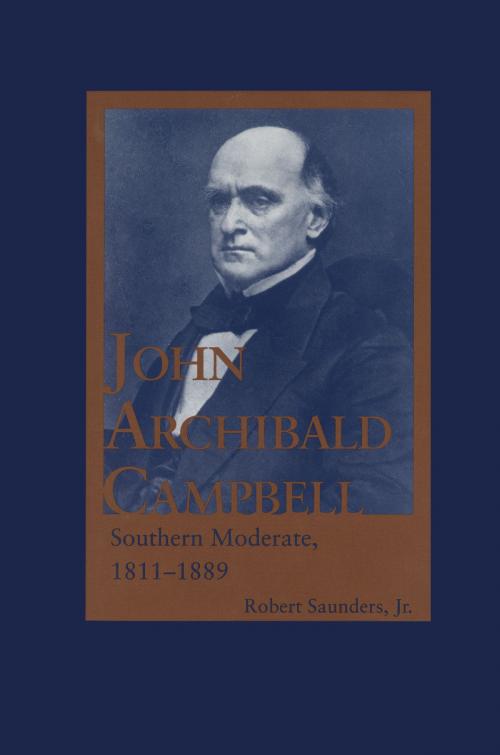John Archibald Campbell
Southern Moderate, 1811–1889
Nonfiction, History, Americas, United States, 19th Century, Biography & Memoir, Political| Author: | Robert Saunders | ISBN: | 9780817391546 |
| Publisher: | University of Alabama Press | Publication: | May 16, 2017 |
| Imprint: | University Alabama Press | Language: | English |
| Author: | Robert Saunders |
| ISBN: | 9780817391546 |
| Publisher: | University of Alabama Press |
| Publication: | May 16, 2017 |
| Imprint: | University Alabama Press |
| Language: | English |
Saunders presents the first full biography of the southern U.S. Supreme
Court justice who championed both the U.S. Constitution and states' rights.
The life of John Archibald Campbell reflects nearly every
major development of 19th-century American history. He participated either
directly or indirectly in events ranging from the Indian removal process
of the 1830s, to sectionalism and the Civil War, to Reconstruction and
redemption. Although not a defender of slavery, he feared that abrupt abolition
would produce severe economic and social dislocation. He urged southerners
to reform their labor system and to prepare for the eventual abolition
of slavery. In the early 1850s he proposed a series of reforms to strengthen
slave families and to educate the slaves so as to prepare them for assimilation
into society as productive citizens. These views distinguished him from
many southerners who steadfastly maintained the sanctity of the peculiar
institution.
Born and schooled in Georgia, Campbell moved to Montgomery,
Alabama, in the early 1830s, where he joined a successful law practice.
He served in the Alabama legislature for a brief period and then moved
with his family to Mobile to establish a law practice. In 1853 Campbell
was appointed an associate justice of the U.S. Supreme Court. His concurring
opinion in the Dred Scott case in 1857 derived not from the standpoint
of protecting slavery but from an attempt to return political power to
the states. As the sectional crisis gathered heat, Campbell counseled moderation.
He became widely detested in the North because of his defense of states'
rights, and he was distrusted in the South because of his moderate views
on slavery and secession. In May 1861 Campbell resigned from the Court
and later became the Confederacy's assistant secretary of war. After the
war, Campbell moved his law practice to New Orleans. Upon his death in
1889, memorial speakers in Washington, D.C., and New Orleans recognized
him as one of the nation's most gifted lawyers and praised his vast learning
and mastery of both the common law and the civil law.
In this first full biography of Campbell, Robert Saunders,
Jr., reveals the prevalence of anti-secession views prior to the Civil
War and covers both the judicial aspects and the political history of this
crucial period in southern history.
Saunders presents the first full biography of the southern U.S. Supreme
Court justice who championed both the U.S. Constitution and states' rights.
The life of John Archibald Campbell reflects nearly every
major development of 19th-century American history. He participated either
directly or indirectly in events ranging from the Indian removal process
of the 1830s, to sectionalism and the Civil War, to Reconstruction and
redemption. Although not a defender of slavery, he feared that abrupt abolition
would produce severe economic and social dislocation. He urged southerners
to reform their labor system and to prepare for the eventual abolition
of slavery. In the early 1850s he proposed a series of reforms to strengthen
slave families and to educate the slaves so as to prepare them for assimilation
into society as productive citizens. These views distinguished him from
many southerners who steadfastly maintained the sanctity of the peculiar
institution.
Born and schooled in Georgia, Campbell moved to Montgomery,
Alabama, in the early 1830s, where he joined a successful law practice.
He served in the Alabama legislature for a brief period and then moved
with his family to Mobile to establish a law practice. In 1853 Campbell
was appointed an associate justice of the U.S. Supreme Court. His concurring
opinion in the Dred Scott case in 1857 derived not from the standpoint
of protecting slavery but from an attempt to return political power to
the states. As the sectional crisis gathered heat, Campbell counseled moderation.
He became widely detested in the North because of his defense of states'
rights, and he was distrusted in the South because of his moderate views
on slavery and secession. In May 1861 Campbell resigned from the Court
and later became the Confederacy's assistant secretary of war. After the
war, Campbell moved his law practice to New Orleans. Upon his death in
1889, memorial speakers in Washington, D.C., and New Orleans recognized
him as one of the nation's most gifted lawyers and praised his vast learning
and mastery of both the common law and the civil law.
In this first full biography of Campbell, Robert Saunders,
Jr., reveals the prevalence of anti-secession views prior to the Civil
War and covers both the judicial aspects and the political history of this
crucial period in southern history.















